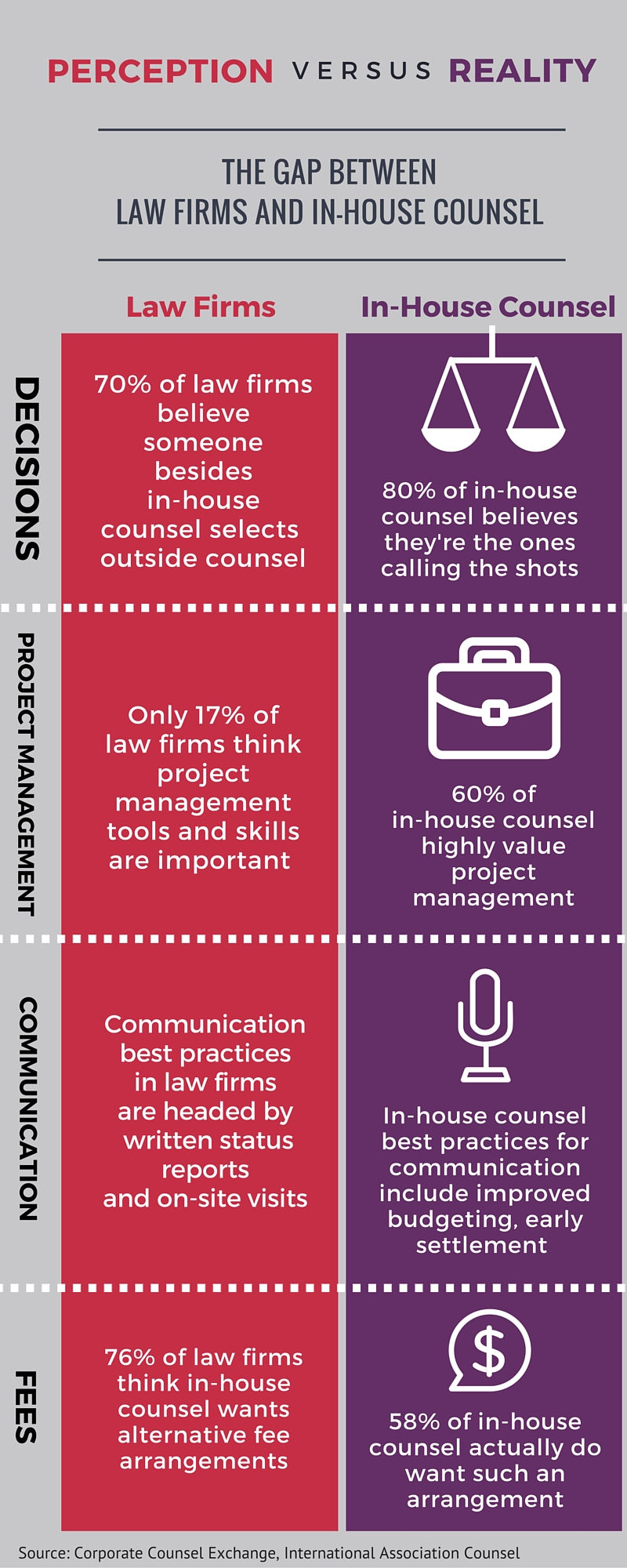Law Firms Are From Mars, In-House Counsel Are From Venus
- R. Peter Fontaine, Senior Advisor, Value Drivers
- Oct 14, 2015
- 4 min read
Counselors, approach the bench.
It appears we have quite a difference of perception in how law firms and corporate counsel view their relationship. The evidence is glaring that, based on the findings of two recent surveys by the Corporate Counsel Exchange and the International Association of Defense Counsel, these two parties are not on the same page.
There isn’t a gap on one or two issues we’re speaking of, either. Our infographic captures the great divide on several key elements to the law firm-corporate counsel relationship, including the selection process and value of certain skills, such as project management (click on the image to enlarge it).
How did we get here? And can the relationship be repaired?
We see similarities to this breakdown all the time in a variety of industries at Value Drivers for clients and external resources they’re considering.
The good news is that steps can be taken to bring the relationship into greater alignment, which is no different than what we see here between law firms and corporate counsel. It begins with identifying and understanding gaps like these between perception and reality.
For example, if yours is a law firm, give these questions some thought based on your in-house counterparts:
What is the thought process of corporate counsel?
What are their biggest challenges?
What is most important to them?
How do they make decisions?
One of the biggest points of difference in understanding revolves around the selection process for outside counsel. While 70% of law firms polled thought a party other than in-house counsel ran the selection process, 80% of corporate counsel disagreed with that statement, believing they were running the process for selection.
If that’s indeed so, then law firms have to do a much better job of understanding what corporate counsel values in a potential partner for outside counsel. Expertise is coveted, but there appear to also be gaps between law firms and the client side on:
Alternative Fee Arrangements
The Importance Of Project Management Skills
Communication of Best Practices
Invoicing Practices
Let’s take invoicing as an example. While in-house clients have complained about the unpredictability of law firm invoices and mismanagement of costs, law firms are complaining about the processing and payment of invoices. In fact, according to one of the surveys, rates are valued just behind expertise in criteria for hiring outside counsel.
Think about how this kind of situation might be alleviated with stronger communication on invoicing and processes – the more upfront, the better.
Is this type of disconnect happening in your own world?
Almost certainly. Perhaps there aren’t mile-wide gaps, but don’t let that be your excuse to be complacent in a “no news is good news, so they must be happy” approach to client loyalty. At a closer look, many of the issues and solutions for bridging the gap apply to many industries – not just the legal one.
Talk to your client about all the pressures they’re facing – whether they impact you directly or not.
During the surveys, one theme respondents kept coming back to was the pressure to manage legal fees. Corporate counsel was open to discussing alternative fee arrangements and legal project management, but law firms were primarily focused on increasing their own fees while managing operational expenses. An ongoing dialogue might’ve put both parties on the same wavelength and help them find common ground on cost containment.
When you get an understanding of a client’s entire landscape of pressures, either you can be the solution directly or you can refer someone who is. In both cases, you’ve positioned yourself as a reliable resource who has been listening to the client.
Have a formal process for engagement / matter evaluation.
Survey findings revealed that only 35% of corporate counsel have used a formal process for evaluating outside counsel. Meanwhile, only 28% reported a structured relationship for performance evaluation with clients.
We continually learn during our client loyalty assessments that firms aren’t leveraging the opportunities in front of them to gain constructive feedback. Doing so would uncover potential gaps in client service and enable your firm with a more specific path for changing behaviors or processes. Don’t be afraid of instilling this type of structure in your own client relationships.
Learn how they make decisions on your services.
Referrals? Request For Proposal? Internet search? According to the surveys, all of these were valid avenues for sourcing law firms by in-house counsel (although referrals influenced the decision 50% of the time).
Discovering how someone makes a decision on your service and what they value most is an obvious goal when aiming to win the business, but how much revenue could be gained by selling just one additional service to an existing client? The state of learning about what motivates your clients to act – or not – can tell you a lot about how well you’re communicating your full range of offerings to them.
If you’ve felt the sting of losing a client’s business to a competitor (and many of us have), it’s a feeling you don’t want to repeat again anytime soon. So how can you find yourself on the same page with your client and address any lingering areas of vulnerability before they become bigger?
Value Drivers’ Change Your Paradigm client loyalty assessment is just the kind of process you need to ensure you’re meeting the needs of the client today while preparing your offerings for what needs might emerge tomorrow. Discover how rewarding our 3-month assessment can be for strengthening your client loyalty by calling Value Drivers at 312.827.2643 or emailing info@valuedriversllc.com.



















Comments